|
|
|
Sort Order |
|
|
|
Items / Page
|
|
|
|
|
|
|
| Srl | Item |
| 1 |
ID:
108878
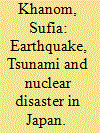

|
|
|
|
|
| Publication |
2011.
|
| Summary/Abstract |
This paper attempts to assess the impacts of the devastating natural disaster - earthquake followed by tsunami, that shook Japan on 11 March 2011, from socio-economic and development point of view. The intensity of the disaster was reflected through a destructive earthquake measuring 8.9 on Richter scale along with a tsunami at a speed of 500 miles/hour. Though, Japan is technologically and economically developed, it described the disaster as the worst crisis in the 65 years of its history since the end of World War II. Huge humanitarian crisis and massive disruption of industrial supply chains negatively affected the economic growth of Japan and put enormous stress on the psyche of Japanese people. The plight of the people had been compounded further by the threat of radiation exposure from the damaged reactors of nuclear power plants at Fukushima. The mishap at nuclear power plants at Fukushima posed some serious questions to the world: how safe nuclear power plants really are? Should the world look for a safer alternative to power problems? The disaster in Japan and its consequences have some serious impacts on Bangladesh from a development perspective. Japan has long been the principal donor and biggest development partner of Bangladesh. But the ongoing crisis in Japan may pose a threat or create some degree of uncertainty to the long term development planning of Bangladesh. Besides, the catastrophic experience of Japan has made Bangladesh rethink about its readiness to encounter similar disasters. As a climate induced vulnerable country, Bangladesh should strengthen its disaster management system by ensuring early warning system, as well as improving rescuing and relief management mechanism to combat such natural calamities.
|
|
|
|
|
|
|
|
|
|
|
|
|
|
|
|
| 2 |
ID:
111761
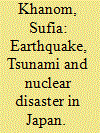

|
|
|
| 3 |
ID:
108880


|
|
|
|
|
| Publication |
2011.
|
| Summary/Abstract |
The Global Financial Crisis 2007-08, originated from the sub-prime mortgage crisis in the US, dipped the world economy to a level worst since World War II. Both the developed and developing economies were hit by the crisis although in varying magnitudes. The present article makes an attempt to compare impact of the crisis on the US and China. It shows that China was less affected by the crisis although structural flaws have made both countries exposed to such crisis. It concludes that although the crisis will diminish the power of the US, it will neither replace the US with China as the next super-power nor lead to a bi-polar world led by the US and China; rather it will lead to a fragmented, multi-polar world.
|
|
|
|
|
|
|
|
|
|
|
|
|
|
|
|
| 4 |
ID:
111763


|
|
|
| 5 |
ID:
108879


|
|
|
|
|
| Publication |
2011.
|
| Summary/Abstract |
Over the last couple of months, the Middle East has been the epicentre of turmoil. The protests for changing the long authoritarian regimes by the civilians have gradually become the flash point of crises throughout the region. After the political unrests in Tunisia and Egypt, conflicts have been spreading in different parts of the region such as Syria, Bahrain, Jordan, Morocco and more precisely in Libya. By now, the involvement of NATO including the USA and other external powers in Libya has been a food for thought for the whole world as to what is going on in this region. The overall situation raises a lot of questions regarding whether the protests would pave the way for democracy or intensify more turbulence and instability. In this backdrop, the main intention of the paper is to highlight the existing situation of the region coupled with the root causes of the conflicts as well as the implications of the crises. Given that, the paper tries to assess the future prospects of democracy in the region. Along with this discussion, the paper has also looked into the role of external powers in the crises.
|
|
|
|
|
|
|
|
|
|
|
|
|
|
|
|
| 6 |
ID:
111762
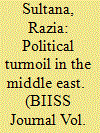

|
|
|
| 7 |
ID:
108877
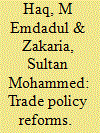

|
|
|
|
|
| Publication |
2011.
|
| Summary/Abstract |
Bangladesh deliberately pursued protectionist economic and trade policy in its early years. However, the country changed the direction shortly after the abrupt political change during mid-seventies and followed the course of reforms in the subsequent years. Although the ice-breaking was quite slow, the reform processes accelerated in the early nineties that resulted many important policy changes. Since then, Bangladesh put its best effort to go with the pace of globalisation and moved rapidly to dismantle the earlier protectionist image of the country. The paper mainly focuses on how Bangladesh persistently adopted the reform measures in the trade policy and gradually approached towards the agendas. It illustrates the changes made to some key trade policy areas, including import and export regimes, exchange rate policy, industrial policy, monetary and fiscal policies, etc.
|
|
|
|
|
|
|
|
|
|
|
|
|
|
|
|
| 8 |
ID:
111760
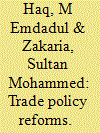

|
|
|
| 9 |
ID:
108881
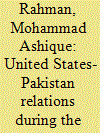

|
|
|
|
|
| Publication |
2011.
|
| Summary/Abstract |
United States-Pakistan relations and devising appropriate policy responses surfaced as one of the most critical foreign policy challenges for the United States since late 2007. The heightened US concern followed the simmering growth of suicide terrorism and extremism in Pakistan as well as the unprecedented increase in al Qaeda and the Taliban attack on the US allied forces in Afghanistan staged from the "safe haven" of Afghanistan-Pakistan border areas. Scholars, analysts and the policymakers started to venture what is wrong with US-Pakistan relations. After the tragic event of 11 September 2001, the United States renewed its relationship with Pakistan, and declared it as an "indispensable ally" against the "global war on terror". It has also been incorporated as a "frontline state" in fighting the US-led war against terrorism in Afghanistan. Ironically, this post-11 September deep alliance between the US and Pakistan also coincided with the latest round of military dictatorship of General Pervez Musharraf in Pakistan. Therefore, a comprehensive analysis of US-Pakistan relations during the Musharraf regime might help us in explaining the problems that their bilateral relations are currently facing and may shed light in formulating future policies for Pakistan afresh. The present paper therefore, focuses on three aspects of the US-Pakistan relations during the Musharraf regime. First, it intends to assess United States' policy objectives during the Musharraf era. Obviously, fighting and eradicating terrorism and extremism was a dominant objective, but there were other objectives as well viz., Pakistan's and global security, nuclear non-proliferation, US's economic and strategic opportunities in South Asia, and democracy promotion in the Muslim world. Second, an attempt is made to analyse the strategies that were followed to pursue the objectives? Economic and security assistances are well-known strategies, but, was implicit support to Musharraf's military regime also a part of US strategy? If yes, what explains such strategy especially since it is contradictory to US's grand strategy of democracy promotion? And finally, what results were achieved by pursuing those policies in such particular way? Therefore, the paper would seek answers to such questions: Were the policies pursued by the US appropriate? Were the ways in which they were pursued the most effective way? Is the present situation in Pakistan an outcome of wrong policies or the wrong strategies? And what explains the lack of US' success?
|
|
|
|
|
|
|
|
|
|
|
|
|
|
|
|
| 10 |
ID:
111764


|
|
|
|
|
|
|
|